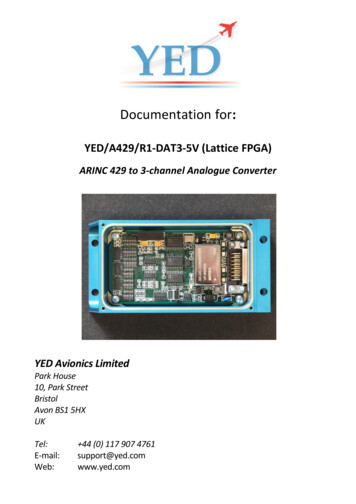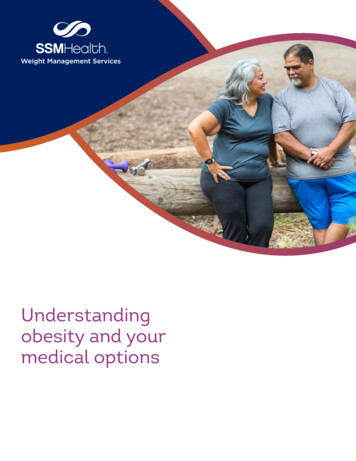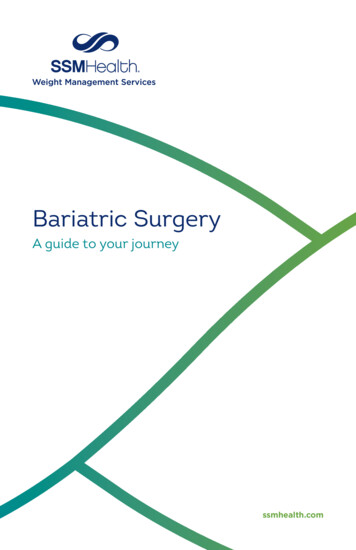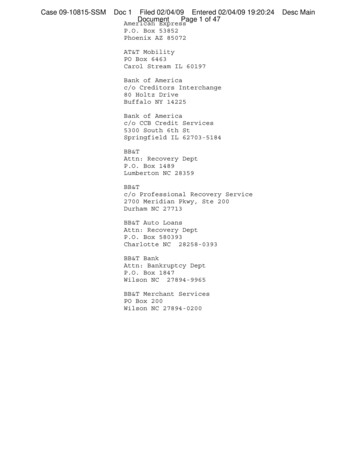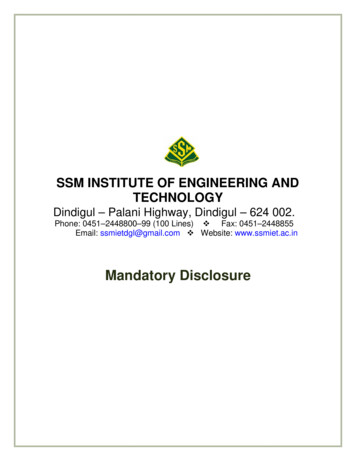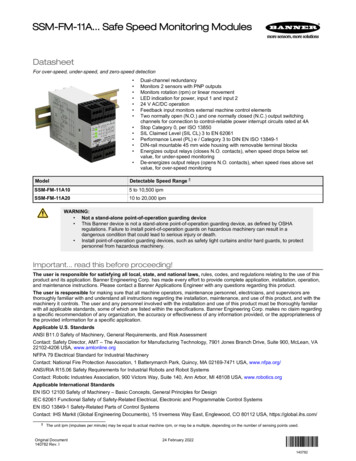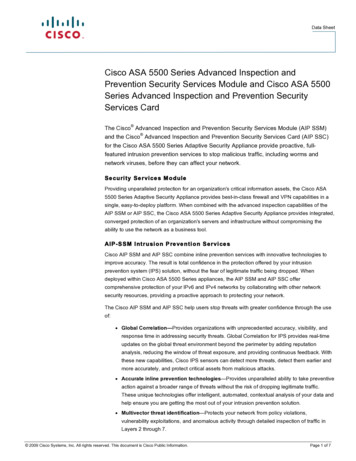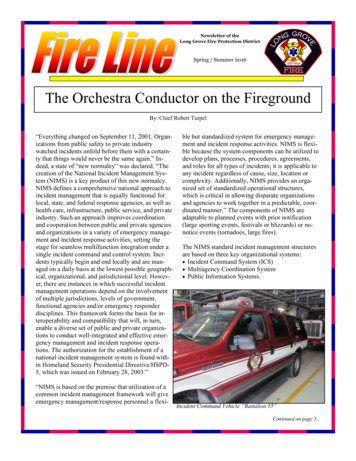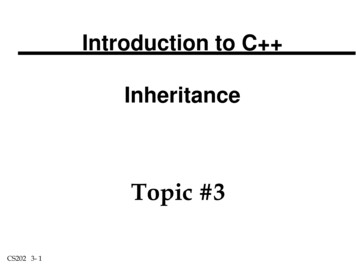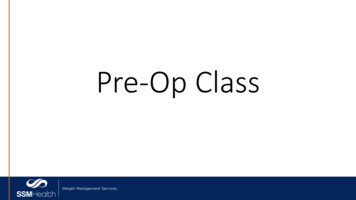
Transcription
Pre-Op Class
MBSAQIPMetabolic and Bariatric Surgery Accreditation and Quality Improvement Program Our center is proud to be accredited through MBSAQIP. MBSAQIP compares SSM WMS to others in our market We report all types of surgeries, surgical outcomes, complications andreadmissions. Required to maintain that standard.
What is Enhanced Recovery A care pathway that is designed to decrease1.2.3.4.5.6.NauseaPainStress after surgerySwellingReduce the amount of narcotic pain medicine required (opioids)Complications A quicker recovery and return to normal activities
Enhanced Recovery Medications Local Anesthetic - Injected to numb nerves going to your incisions. This is injected during surgeryand the effect lasts about 3 days. Narcotics – You will be offered the opioid, Lortab, postop. Remember that opioids have manynegative side effects. Nausea, decreased bowel activity, & drowsiness Anti-Nausea Medications – It is easier to prevent than treat nausea. Patch or IV While on the medical floor you will be given IV antiemetrics routinely. If this does not help please notify your nurseso that she may speak with the surgeon for further treatment.
Start Preparing Weeks Prior to Surgery Don’t gain weight. Surgeries can be cancelled due to weight gain. Follow your diet Stay active Get plenty of sleep CPAP - wear as directed to insure adequate quality sleep
Please Stop ALL OTC BLOOD THINNERS 5-7 DaysBefore Surgery to Prevent Bleeding Blood Thinners Aspirin (Except for prescribed 81mg dose)IbuprofenAdvilMotrinAleveVitamin EFlaxseed OilFish OilOmega 3
Night Before Surgery Drink your clear liquids – Water, Decaf tea or coffee (no cream), broth Drink 24oz of Carbohydrate drink 100% Apple Juice100% Cranberry Juice100% Pulp free orange juice100% Grape JuiceStay away from Cocktail Juice.Gatorade (Original) Clean skin with cleanser as instructed by Surgery Evaluation Center. Don’t Forget your Belly Button Do not shave surgical area.
Morning of Surgery Take medications as instructed by Surgical Evaluation Center Clean your skin with cleaner as instructed by Surgical Evaluation Center Drink 24 oz of a carbohydrate drink Have the drink consumed 2 hours before you arrive at the hospital 4 hours prior to your surgery Dress in comfortable clothes and shoes – nothing tight around the waist
Morning of Surgery Park in either Lot 1 or 2. Enter through the East lobby Entrance Go to 2nd floor of the South Medical Bldg. Check in at the OutpatientSurgery waiting room. Use Restroom-only after checking with nursing staff
What to bring Items needed : Photo ID, Health insurance card, Current list of medications including herbals and supplements. You can bring a pillow, don’t use a white pillow case. Please bring your C-Pap for use after surgery in your room.
What to leave at Home Remove all jewelry and anything else that is removable Leave valuables at home Medication from home
Surgery Length of Surgery Band 30-60 minutesSleeve 60-90 minutesRYGB 60-90 minutesRevisions 1-3 hoursDS 60-90 minutes* Typically a 1-2 night stay for Sleeve, RYGB and DS
Recovery Typically spend 1-3 hours in the recovery room 3 goals of recovery room1. Wake up from anesthesia2. Get pain management underway3. Nausea management underwayThere will NOT be any drains or tubes after surgery.
Night of Surgery You will be admitted to either 6 South or 3 North, staff havespecialized training for Bariatric patients. Nausea – If nauseated, tell your Nurse Pain - You will be offered p.o. Liquid Lortab or Tylenol for pain controlevery 4 hours. Deferred gas pain to shoulder
Night of Surgery Get out of bed and walk – you will be allowed to wear your own clothes towalk in the halls. decrease risk of blood clotsIncrease lung capacityHelp eliminate abdominal gasHelp your bowels to return to normal. Sip fluids and save cups for fluid calculations. Staff will track the amount offluid in and amount of fluids out. Wear compression sleeves when you’re in bed Morning After Surgery Swallow Study- In Radiology, do not drink after 6am, then continue drinks after test.
Discharge from the Hospital Increased fluid intake Tolerating protein and 4-6oz liquid/ hour Pain and nausea under control Purchase your Lortab at the Pharmacy prior to leaving If your ride home is one hour or more drive – You should stop andwalk for 10 minutes for each hour of driving to prevent blood clots
PharmacyAt Home Medications Prilosec- 6 Months Lortab- As Needed for Immediate Post-Op Pain Control (Short Term) Tylenol- Long Term Pain Control No NSAIDS for Life
Additional Information Stop All Steroid use At least 2 weeks prior and 4 weeks after surgery No Alcohol for a year Stop Smoking for life Can cause ulcers No NSAIDS No Estrogen based hormonal birth control for 2 week prior till 4weeks after surgery.
For the first 4 weeks after surgery donot swallow any pills larger than thesize of a regular Aspirin.
At Home MUST Ambulate frequently (at least 4-5 times per day) Continue walking regularly and increase duration and intensity as tolerated. Use incentive spirometer 10 deep breaths in a row every hour, continue for 10 days Leave incisions open to air NO Band-Aids and do not pick at incision glue Shower daily preferably with an antibacterial soap (Dial) Pain and Nausea – Take prescriptions given as needed. Use ice pack on sore areas. Ask for an abdominalbinder If pain or nausea persist, please contact us. Advance diet ONLY upon Providers recommendation. No baths, hot tub, soaking or swimming for 4 weeks (until the incisions are completely healed) No Blind Nasogastric Tube Insertion
Recommendations for GAS: Gas pain is relieved by walking You may also use GAS-X; the dissolvable strips are available and easy to use CONSTIPATION Constipation is prevented by walking and adequate fluid intake.You may use a stool softener 1-2x per day.For irregular bowl movements try Benefiber powder.Miralax or Milk of Magnesia can be used daily as needed.If you have no results in 2-3 days: use a suppository.Contact us if problem persists.
When to Call the OfficeVOMITING (IS NOT NORMAL)NauseaPain uncontrolled with medicationFever over 101 degrees FahrenheitShortness of BreathVery Fast heart rateBleedingIncision redness, drainage, warm to touchUse MY CHART for NON URGENT Questions, if youare not signed up for My Chart, please do so today. Whenever you have a question! Food, Pain, Medications, Fluids, Activity
This a case by case basis decision. It will depend on the level of work activityyou have and in particular the amount of bending or lifting in your job. Please discuss specific work limitations with your N.P. at your 1 weekfollow-up. Most of you will be released back to work at your 4 week visit. Once released, it is typically the expectation of your work that you return onthe next business day.
Follow-up Visits It is Imperative that you keep your ALL appointment. We need to monitor your health. Please arrive 15 minutes early for all appointments. You will be seen at 1-week, 1-month, 6-months, and 1-year. DS Patients: 1-week, 1-month, 3-months, 9-months, 1-year We will then need to see you EVERY YEAR after. 1 month follow-up Sleeve Patients: will be in this Classroom. Please let us know before class, if you need a return towork note. All Others: Will be seen by appointment.
Possible Early Complications Staple or suture leaks Intra-abdominal bleeding Respiratory distress Blood clots
Possible Late Complications Cholecystitis (gallbladder) Incisional Hernia Vitamin Deficiency Peptic Ulcers
Press Ganey SurveyAfter your discharge from the hospital you may receive a survey aboutyour carePlease fill that out and give 6 South the top score!
Get body ready for surgical stressSummary No weight gain Drink 24 oz. Carbohydrates night before and morning of surgery Walk frequently Sips fluids & gradually increase fluid intake Take Prilosec and other Rx as recommended Wear compression sleeves and use incentive spirometer Call or MyChart with questions or concernsCongratulationsand Rapid Recovery
Metabolic and Bariatric Surgery Accreditation and Quality Improvement Program Our center is proud to be accredited through MBSAQIP. MBSAQIP compares SSM WMS to others in our market We report all types of surgeries, surgical outcomes, complications and readmissions. Required to maintain that standard.
